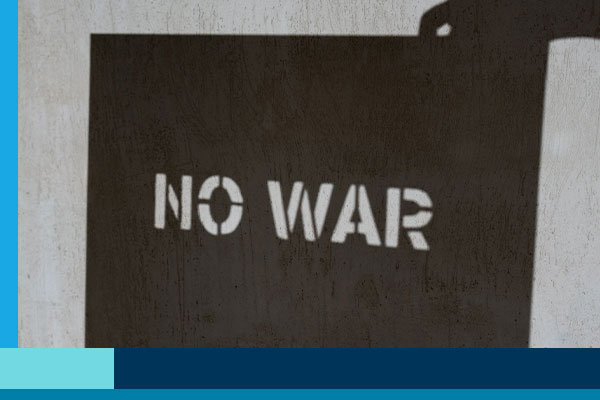In a world filled with personal battles and burdens, where we struggle to hold ourselves together amidst the chaos, it’s impossible to ignore the pervasive nature of conflict. On a global scale, wars and disputes of different magnitudes have plagued humanity throughout history. Today, against the backdrop of world events and the occasion of Remembrance Day, we embark on a journey to address what the world is pondering. How should we, as followers of Jesus, make sense of the world’s conflicts, the prophecies in the Bible, and the accusations that religion is the source of war?
The Complex Nature of War
Conflict, in its many forms, has afflicted our world on an unprecedented scale. From the trenches of the World Wars to the contemporary conflicts that grip nations, we’ve seen humanity grapple with turmoil that transcends borders. These are times when joy seems out of place while the weight of sorrow and suffering grips our international neighbours. As we navigate these troubling times, many of us struggle with survivor’s guilt— recognizing our blessings, which seem undeserved. How can we reconcile our own happiness with the sorrow and starvation endured by so many?
Religion’s Role in Conflict
One cannot deny that religions, often symbols of peace and goodwill, find themselves entangled in conflicts. Recent events have cast a harsh spotlight on this issue, fostering suspicion and unrest within communities. It raises the question of whether religion is, in fact, a contributor to conflicts worldwide. The three volume Encyclopedia of Wars has catalogued nearly 2000 wars in historical records. About 7% were attributed to religious reasons. Most are driven by politics, power and greed.
It is also prudent to distinguish the actions of religious extremists from the broader religious communities they claim to represent. Fundamentalist outliers should not define an entire faith, just as the Ku Klux Klan’s actions should not represent all Christians. While Hamas claims to act in the name of Islam, it does not represent the beliefs of all Muslims.

The Human Nature of Violence
Before organized religion, violence and conflict were inherent in humanity corrupted by sin. The roots of aggression run deep, and violence has existed from the earliest chapter of our story.
In the book of Genesis, shortly following Adam and Eve’s rebellion, we read how jealousy and envy fueled an anger in their son Cain, who then murders his own brother Abel. Violence was present long before religious structures emerged.
Holy War in Scripture
God’s covenant with Abraham, a unique pledge of partnership, aimed to form a lineage for the promised Messiah and a people known for their generosity and care of others in stark contrast to prevailing nationalism. God’s command to bless other nations implies they coexist and are not annihilated. In Genesis 15, when the land of Canaan was promised to Abraham, it comes with a caveat that it will not be turned over until the sin of the Amorites reaches a level of severity so egregious that no one would question their demise. Scripture and archeology attest that this culture was rife with horrific practices including child sacrifice and bestiality. Their fate would be unquestioned.
In several cases God’s divine intervention drives the people from the land first. The Israelite armies are told to first offer peace to cities in the land they are promised. The battle of Jericho, the first city of conquest in the Promised land notes Rahab who humbly reveres God is saved, while the arrogant who place their confidence in thick walls are crushed by collapsing stone.
When Jesus arrives on the scene, it becomes clear in His teaching He intends to build a spiritual kingdom and fulfill prophecies in unexpected ways. From a close study of Ezekial and Revelation we see the New Jerusalem is not established in earth’s current era but will be fashioned in heaven. This challenges the idea that Jesus’ second coming relies on Jewish control of Jerusalem. Jesus’ role was to be a new Adam, a new Israel, being faithful to God in a way Jacob’s descendants and every human before and since has failed to. One of the greatest teachings of Jesus promises the greatest blessing to peacemakers.
Responding to Conflict Today
Amidst the turmoil of contemporary conflicts, our primary focus should be on compassion and humanitarian aid. The suffering of innocent civilians demands our attention and action. Humanitarian relief efforts must be at the forefront of our response. Rather than engaging in debates about prophetic timelines, our focus as Christians should be on prayer and advocating for peace and protection of the vulnerable. We should pray for a change of heart in those initiating violent acts, and for the salvation of all.
In the complex world we live in, war and conflict are ever-present challenges. Yet, we find guidance in the teachings of Jesus, who emphasized the path of compassion, empathy, and peace. As followers of Christ, our mission is not to engage in physical holy wars but to wage spiritual battles through love, empathy, and prayer. While the world grapples with strife, our focus remains on alleviating suffering, offering hope, and embodying the principles of a God who is love, even in the face of conflict.


